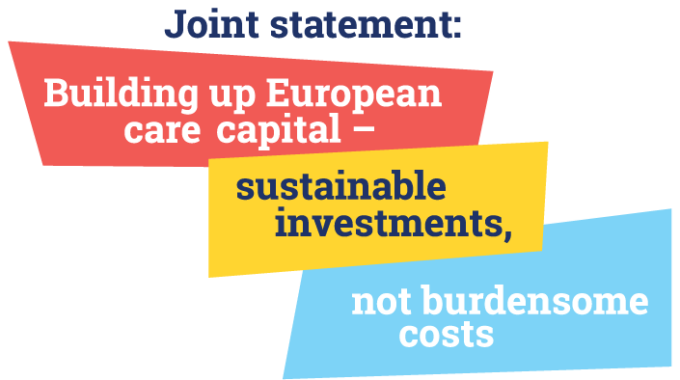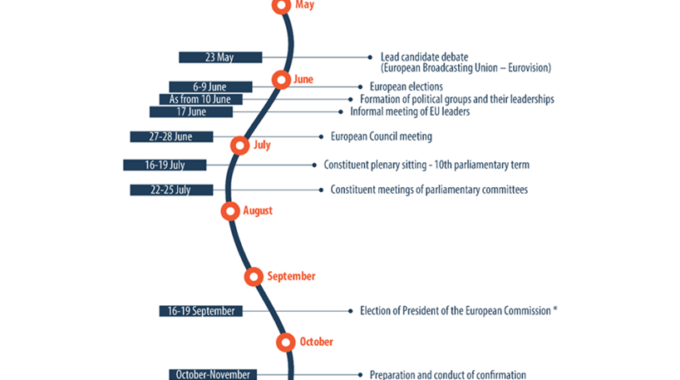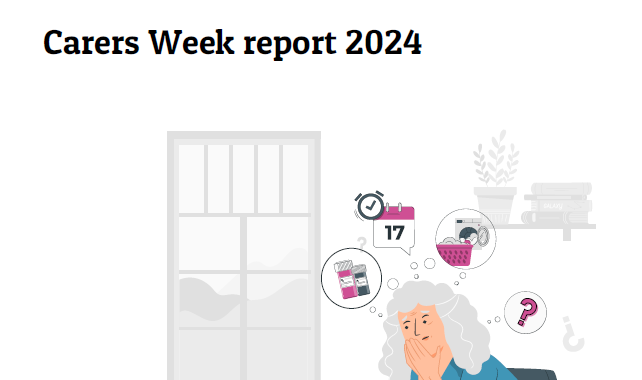
Building up European care capital: sustainable investments, not burdensome costs
On the first UN International Day of Care and Support,
16 European organisations call for urgent measures to address underinvestment and staff shortages in long-term care.
The first UN International Day of Care and Support is a welcome initiative that marks a positive development in the recognition of the vital importance of care and of those who provide it in our societies. We hope that the welcome momentum generated by the UN International Day of Care and Support will catalyse and inspire substantive actions across the European Union.
According to the 2022 EURES Report on labour shortages and surpluses, there are critical shortages in health and social care occupations across many, if not all, European countries. Everywhere, organisations have been raising the alarm about the shortage of care services, professional care staff, insufficient support to informal carers, and the dangerous and immediate consequences for the entire society.
At the EU level, the European Care Strategy paves the way for the transformation of the sector and the creation of a person-centred, community-based care and support system. It lays the foundation for a system that will respect the rights and dignity of persons in need of care and support, and their families as well as carers, both professional and informal. This strategy needs to be fully and adequately transposed to address EU Member States’ realities through ambitious national measures to be submitted to the European Commission by June 2024. These must present concrete actions to address qualified professional care staff shortages.
Understaffing and underinvestment in care are nothing new. Underneath remains the issues of ableism[1] and ageism and other discriminations based on gender stereotypes, migration or residence status, and other grounds of discrimination that affect both care receivers and caregivers.
Care is still considered a woman’s duty, with 44% of Europeans thinking that the most important role of a woman is to take care of her home and family.[2] This leads to women absorbing 90% of the paid care staff jobs, which are undervalued, low paid, precarious and with little to no career advancement or development.[3] The scale of the problem has grown incrementally of late, notably due to the COVID-19 and cost-of-living crises.[4] Finding competent, well-trained and stable staff remains a challenge in every country of the region. This has consequences on all persons working in the sector with too many dealing with poor working and occupational health and safety, leading to burnout, stress and anxiety, further deteriorating mental health, third party violence and low staff retention for service providers.[5]
On the side of persons who draw on care and support services, the shortages can result in a denial of human rights with sometimes life-threatening consequences[6] and affect the quality of the care and support services provided. The shortages in adequate services and in staff can also amount to a violation of the human rights of persons entitled to care services under the United Nations Convention on the Rights of Persons with Disabilities (UNCRPD) and the EU Charter of Fundamental Rights, and a denial of their dignity, autonomy and rights to social inclusion and participation. Among persons with severe difficulties in personal or household activities, almost 50% of persons aged 65+ had an unmet need for care in 2019.[7] People with high support and/or care needs who require daily assistance to enjoy their human rights and live independently, are left alone in sometimes dire situations, some having to wait days for daily hygiene tasks, not eating, not going to the restroom nor getting out of bed. They face problems of constant staff turnover at the expense of the care receiver. Moreover, inadequate staff training, ranging from language and intercultural communication abilities to more practical and job-related competences, places additional barriers and can result in abuse and neglect. To address the shortfall, informal carers (where they exist) have to step in, often to the detriment of their own health, financial stability and social inclusion.
Helping a loved one and moving from the role of parent, spouse, brother, sister or child to that of informal carer must be a choice, but this choice is often not possible because of the failure of the care systems. The shortage of home and community-based services make the help provided by informal carers, who are in 80% of the cases women, increasingly essential, but this is adding to the tasks and responsibilities of informal carers. Due to the lack of adequate support, too many carers suffer from an unbearable responsibility and a permanent state of anxiety, not least about the future, when they will no longer be able to provide the necessary support to their relatives. Burnout, social isolation, financial struggles, lack of work-care-life balance are a reality for these carers. This is not sustainable and strong measures need to be taken to recognise informal carers and grant them the necessary rights and support so that they can continue to be partners in care. It is important to identify informal carers and recognise that their role is to support and collaborate with well-trained, quality professional staff, not to replace them.[8]
On the first UN International Day of Care and Support, the undersigned organisations state that there cannot be a healthy care and support system if the rights and dignity of any of the groups that compose it are denied or violated. Care and support are part of the fabric of our society and should be treated as such, as a societal shift that involves all actors. Rightly so, the EU has made access to long-term care one of the principles of its landmark flagship initiative – the European Pillar of Social Rights (principle 18). Long-term care is considered a social right and a fundamental determinant of health across the life-course.[9] The European Care Strategy and the 2022 Council Recommendation on Long-Term Care, pave the way for person-centred measures that aim to guarantee availability, accessibility, affordability and choice of care services, improve working conditions and address staff shortages and the gender imbalances in the sector; as well as providing support to informal carers. This cannot be achieved without investments in the development of care services enabling human rights of all, professionalisation of care, improving workers’ skills through continuous professional development enhancing the attractiveness of the sector, and reprioritising the value and the contribution of care and caring communities to our economies and societies. Care, just like health, is not a commodity and we need to ensure universal access to health and social care. Without this, there can be no shift. Life-threatening situations will persist, scandals in care settings will keep occurring, and the rights and dignity of all stakeholders will keep being denied and violated. The current demographic dynamics will lead the system to collapse. Without social protection coverage for the costs of care, serious investments in community-based care services, personal assistance, staff recruitment, training and retention, no alternative system can be created, and everyone will feel the economic and social consequences of a large-scale crisis of care and support.
On this day, the undersigned organisations call on all stakeholders to invest in the transition to community-based, person-centred high-quality, affordable and accessible long-term care systems. We call namely on:
- Member States to
- present by June 2024 appropriately funded, ambitious, time-bound and targeted measures to improve and expand their long-term care systems, supported by a national monitoring and evaluation mechanism;
- urgently work with the social partners and civil society on actions in the framework of the national measures and action plans to sustainably address the needs of the long-term care workforce in view of enabling human rights-based principles.
- The European Commission to boost implementation of the European Care Strategy, namely by
- creating a monitoring and evaluation framework, with qualitative and quantitative indicators which foster the development of strong national action plans on long-term care towards improved service coverage, more affordable quality care and coordination of care services across people’s life-course;
- creating a European Long-Term Care Platform to coordinate the implementation of the Strategy with the involvement of the national coordinators, those who draw on care and support services, people who provide it and their representative organisations;
- continuing support to the Members States through the Technical Support instrument and systematically follow their investments in long-term care through the European semester process;
- pursuing the Economic Governance Reform in a direction that gives Member States the necessary flexibility to foster social investments into care services.
- proposing European Year of Care and Support.
- The Council of the European Union to swiftly adopt the Council Conclusions on the transition of care systems throughout life towards holistic, person-centred and community-based models that respect the rights of carers and of the persons in need of care and support, ensuring they put human rights at the centre.
- The EU parliament to:
- support necessary financial and fiscal governance policies that supports Member States to invest more on long- term care;
- to monitor closely and support the implementation of the European Care Strategy.
Signatories :
[1] Ableism and its impacts have been described as “a value system that considers certain typical characteristics of body and mind as essential for living a life of value. Based on strict standards of appearance, functioning and behaviour, ableist ways of thinking consider the disability experience as a misfortune that leads to suffering and disadvantage and invariably devalues human life.” CRPD/C/GC/8: General comment No. 8 (2022) on the right of persons with disabilities to work and employment
[2] Report on equality between men and women in the EU,European Commission, 2018
[3] European Care Strategy, European Commission, 2022
[4] Stop the cost-of-living crisis from harming Social Service provision, EASPD, 2022
[5] EPSU report reveals hundreds of thousands of long term care workers leaving the sector, EPSU, 2021
[6] In France, the ombudswoman is looking into cases of “endangering the lives of others and general failure to assist persons in danger” after a call from civil society organisations . The staff shortages and its consequences were already one of the grounds on which the Council of Europe had denounced the violation of the rights of persons with disabilities and their families in France in April of this year; Le Conseil de l’Europe dénonce la violation des droits des personnes en situation de handicap par l’Etat français
[7] 2021 Report on Long-Term Care,Vol. 1. European Commission and Social Protection Committee, 2021
[8] Mind the gap: the EU Care Strategy must promote gender equality, COFACE Families Europe, 2022.
[9] European Pillar of Social Rights as a Pillar for Health Equity – Flashcard tool. Principle 18 – Long-term care, EuroHealthNet






